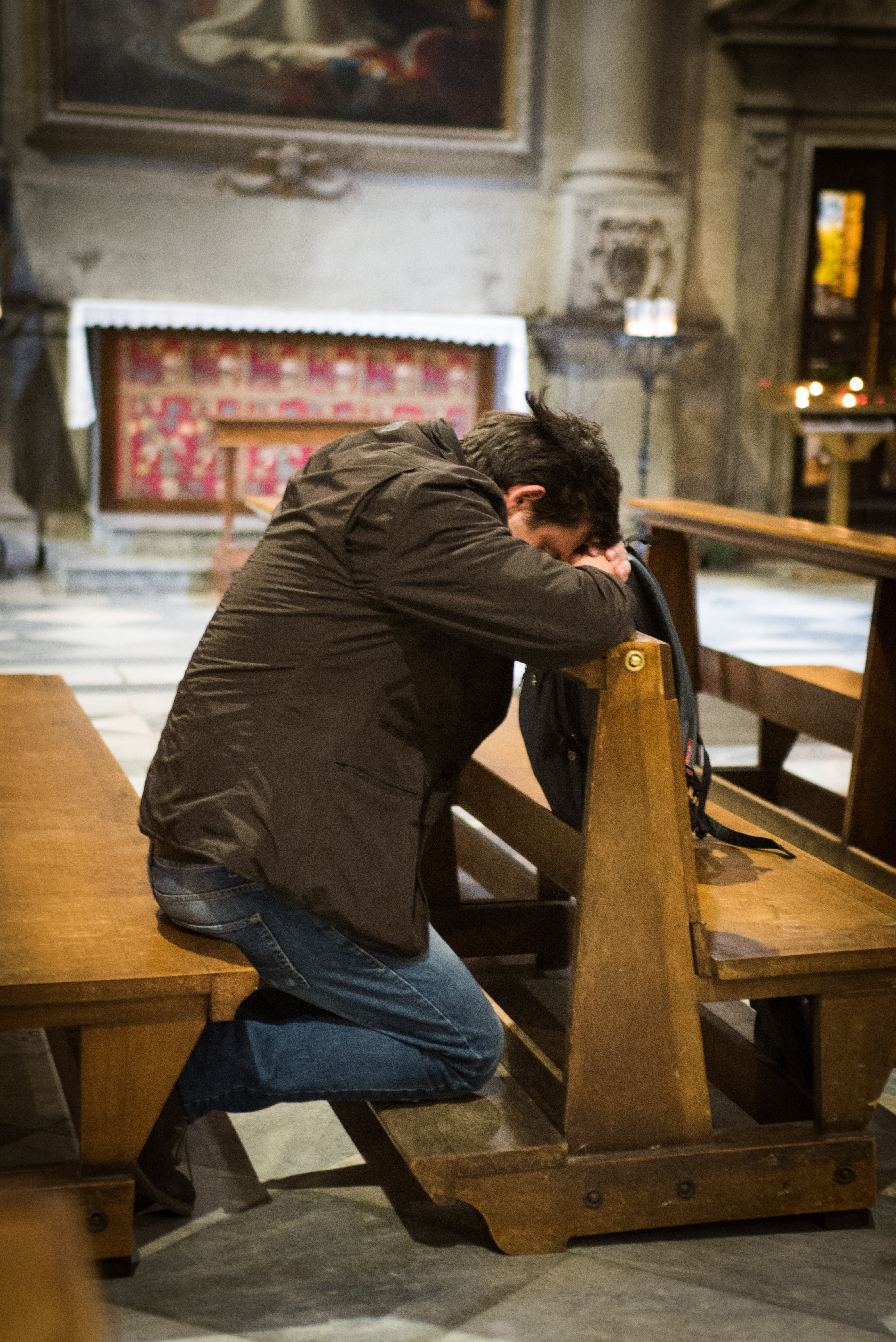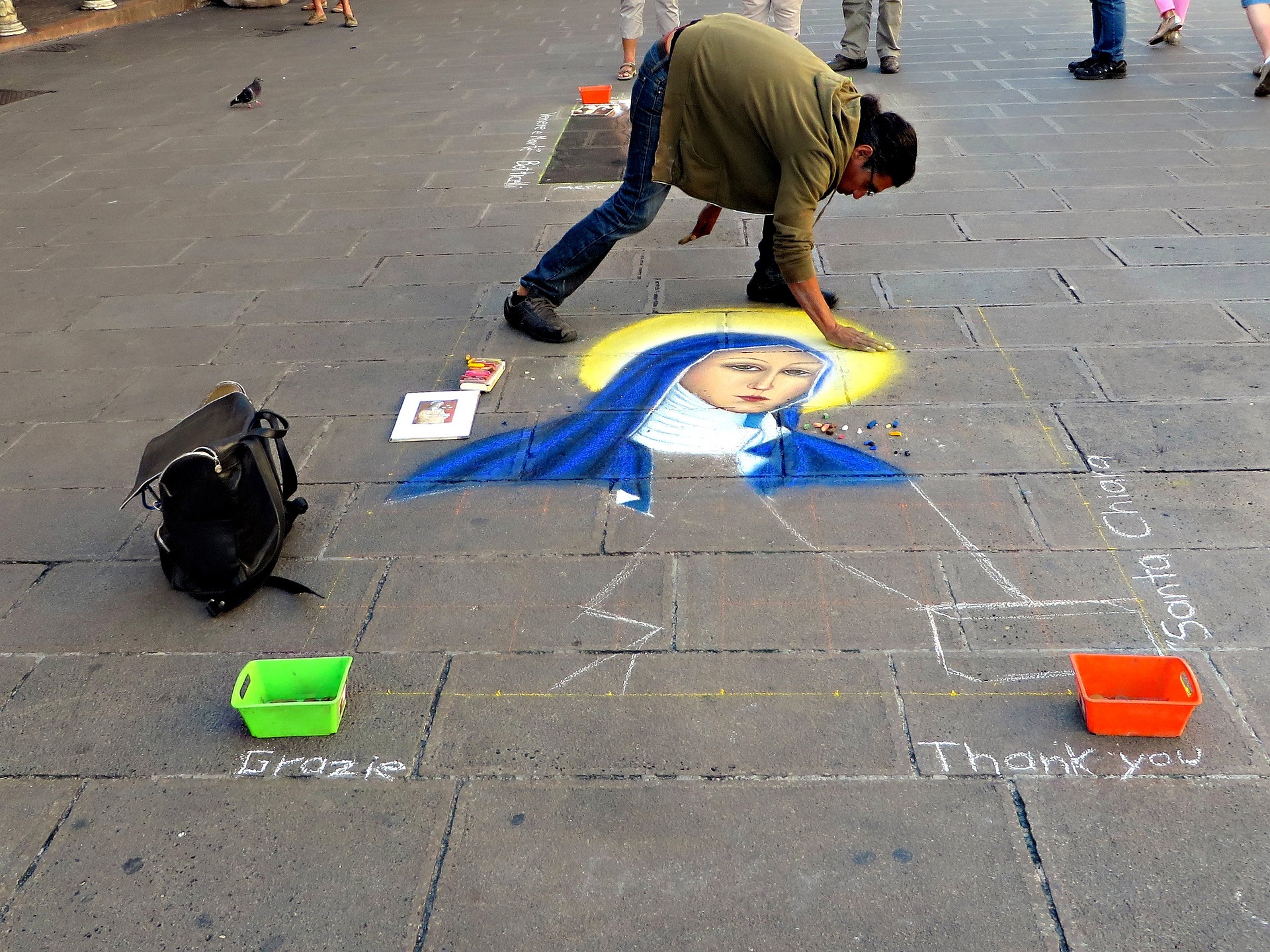In today’s Gospel reading, Jesus was not deaf to the pleas of the Canaanite woman, but he did not respond to her right away. When he did respond, he appeared to be insulting her. Why? Theologians have offered various perspectives on this interaction, but Jesus’ response certainly wasn’t due to prejudice! Jesus may have been using this lesson to help his apostles see what was on the horizon. A bridging of the gap between the old attitudes and the new realities; between the Old Covenant understanding that foreigners were excluded from salvation and the fact that Jesus would soon offer the gift of salvation to the whole world. But the one message that comes through loud and clear in today’s Gospel is the faith of the Canaanite woman. Jesus tests her faith, and she comes through with flying colors!
Something I find interesting about this story and others like it, is how our Lord allows others to “persuade” him to act. In a shocking, deeply mysterious cooperation with us, and never outside of His providential will, He gives mere human beings the ability to change outcomes. At the wedding at Cana, He is seemingly reluctant to do his first miracle, but his mother’s intervention prompts him to act. In another scenario, He is walking toward Jairus’ home in the midst of a large crowd and the woman with the hemorrhage covertly touches his garment. Without Jesus’ clear permission, she receives healing. Then there is the woman in today’s Gospel who doesn’t allow Jesus’ comment to crush her but continues to plead her cause and thereby receives the blessing of her daughter’s deliverance.
These faithful women do not perceive themselves as entitled. Quite the opposite! They are extremely humble. This humility, this knowing-who-they-are, helps them to recognize who Jesus is and what he is capable of. These women do not demand what they want, but they have great confidence in Jesus, and they persist. Their faith is astounding.
Many of us have an inability to perceive how great our need is (I’m okay, you’re okay), and mistakenly think we must solve our problems independently. We don’t like to think of ourselves as helpless, weak, and unable to produce results without someone else’s assistance. “Believe in yourself,” is a much more popular motto than “Believe in Jesus.”
This is all nonsense. I am not okay. You are not okay. We are sinners and we need a savior. We need help every moment of every day to live the life God is calling us to. God provided a remedy for our sin problem, and Jesus alone is the Savior we so desperately need. Mother Mary, the woman with hemorrhage, and the Canaanite woman from today’s Gospel knew that Jesus was the answer to every problem. Jesus’ response to all three of them can be summed up in his response to the Canaanite woman: “O woman, great is your faith! Let it be done for you as you wish.”
En la lectura del Evangelio de hoy, Jesús no ignoró las súplicas de la mujer cananea, pero tampoco le respondió de inmediato. Cuando respondió, parecía estar insultándola. ¿Por qué? Los teólogos han ofrecido varias perspectivas sobre esta interacción, ¡pero la respuesta de Jesús ciertamente no se debió a prejuicios! Jesús pudo haber estado usando esta lección para ayudar a sus apóstoles a ver lo que había en el horizonte. Un puente de la brecha entre las viejas actitudes y las nuevas realidades; entre la comprensión de la Antiguo Alianza de que los extranjeros estaban excluidos de la salvación y el hecho de que Jesús pronto ofrecería el regalo de la salvación a todo el mundo. Pero el único mensaje que llega alto y claro en el Evangelio de hoy es la fe de la mujer cananea. ¡Jesús prueba su fe, y ella sale ganando!
Algo que encuentro interesante sobre esta historia y otras semejantes, es cómo nuestro Señor permite que otros lo “persuadan” a actuar. En una cooperación impactante y profundamente misteriosa con nosotros, y nunca fuera de Su voluntad providencial, les da a simples seres humanos la capacidad de cambiar los resultados. En las bodas de Caná, parece dudar de hacer su primer milagro, pero la intervención de su madre lo impulsa a actuar. En otro escenario, camina hacia la casa de Jairo en medio de una gran multitud y la mujer con la hemorragia toca disimuladamente su manto. Sin el claro permiso de Jesús, ella recibe sanidad. Luego está la mujer en el Evangelio de hoy que no permite que el comentario de Jesús la desalienta, sino que sigue abogando por su causa y, por lo tanto, recibe la bendición de la liberación de su hija.
Estas mujeres fieles no se perciben a sí mismas con derecho a nada. ¡Todo lo contrario! Son extremadamente humildes. Esta humildad, este saber-quiénes-son, les ayuda a reconocer quién es Jesús y de qué es capaz. Estas mujeres no exigen lo que quieren, pero tienen una gran confianza en Jesús y persisten. Su fe es asombrosa.
Muchos de nosotros somos incapaces de percibir cuán grande es nuestra necesidad (yo estoy bien, tú estás bien) y pensamos erróneamente que debemos resolver nuestros problemas de manera independiente. No nos gusta pensar en nosotros mismos como indefensos, débiles e incapaces de producir resultados sin la ayuda de otra persona. “Cree en ti mismo” es un lema mucho más popular que “Cree en Jesús”.
Todo esto es una tontería. No estoy bien. No estás bien. Somos pecadores y necesitamos un salvador. Necesitamos ayuda en cada momento de cada día para vivir la vida a la que Dios nos está llamando. Dios proporcionó un remedio para nuestro problema del pecado, y solo Jesús es el Salvador que necesitamos desesperadamente. La Madre María, la mujer con hemorragia y la mujer cananea del Evangelio de hoy sabían que Jesús era la respuesta a todos los problemas. La respuesta de Jesús a los tres se puede resumir en su respuesta a la mujer cananea:”Mujer, ¡qué grande es tu fe! Que se cumpla lo que deseas”.
 A lover of Jesus Christ, a wife, and a mother of five, Christine is the author of Everyday Heroism: 28 Daily Reflections on the Little Way of Motherhood. She is a graduate of Franciscan University, an instructor for the Institute for Excellence in Writing, and an experienced catechist. Thrilled to have recently become grandparents, she and her husband currently live in Upstate, NY. Visit her author webpage at christinehanus.com
A lover of Jesus Christ, a wife, and a mother of five, Christine is the author of Everyday Heroism: 28 Daily Reflections on the Little Way of Motherhood. She is a graduate of Franciscan University, an instructor for the Institute for Excellence in Writing, and an experienced catechist. Thrilled to have recently become grandparents, she and her husband currently live in Upstate, NY. Visit her author webpage at christinehanus.com
Feature Image Credit: Luis Ángel Espinosa, LC, cathopic.com/photo/3045-praying-on-my-knees


 Sheryl is happy to be the number 1 cheerleader and supporter for her husband, Tom who is a candidate for the Permanent Diaconate in the Diocese of Kalamazoo. They are so grateful for the opportunity to grow together in this process. Sheryl’s day job is serving her community as the principal for St. Therese Catholic School in Wayland, Michigan. Since every time she thinks she gets life all figured out, she realizes just how far she has to go, St. Rita of Cascia is her go-to Saint for intercession and help. Home includes Carlyn, a very, very goofy Golden Retriever and Lucy, our not-so-little rescue puppy.
Sheryl is happy to be the number 1 cheerleader and supporter for her husband, Tom who is a candidate for the Permanent Diaconate in the Diocese of Kalamazoo. They are so grateful for the opportunity to grow together in this process. Sheryl’s day job is serving her community as the principal for St. Therese Catholic School in Wayland, Michigan. Since every time she thinks she gets life all figured out, she realizes just how far she has to go, St. Rita of Cascia is her go-to Saint for intercession and help. Home includes Carlyn, a very, very goofy Golden Retriever and Lucy, our not-so-little rescue puppy. 
 Mike Karpus is a regular guy. He grew up in Michigan’s Upper Peninsula, graduated from Michigan State University and works as an editor. He is married to a Catholic school principal, raised two daughters who became Catholic school teachers at points in their careers, and now relishes his two grandchildren, including the older one who is fascinated with learning about his faith. He also has served on a Catholic school board, a pastoral council and a parish stewardship committee. He currently is a lector at Mass, a Knight of Columbus, Adult Faith Formation Committee member and a board member of the local Habitat for Humanity organization. But mostly he’s a regular guy.
Mike Karpus is a regular guy. He grew up in Michigan’s Upper Peninsula, graduated from Michigan State University and works as an editor. He is married to a Catholic school principal, raised two daughters who became Catholic school teachers at points in their careers, and now relishes his two grandchildren, including the older one who is fascinated with learning about his faith. He also has served on a Catholic school board, a pastoral council and a parish stewardship committee. He currently is a lector at Mass, a Knight of Columbus, Adult Faith Formation Committee member and a board member of the local Habitat for Humanity organization. But mostly he’s a regular guy.


 Susan Ciancio has a BA in psychology and a BA in sociology from the University of Notre Dame, with an MA in liberal studies from Indiana University. For the past 19 years, she has worked as a professional editor and writer, editing both fiction and nonfiction books, magazine articles, blogs, educational lessons, professional materials and website content. Thirteen of those years have been in the pro-life sector. Currently Susan freelances and writes weekly for HLI, edits for American Life League, and is the executive editor of Celebrate Life Magazine. She also serves as executive editor for the Culture of Life Studies Program—an educational nonprofit program for K-12 students. You can reach her at
Susan Ciancio has a BA in psychology and a BA in sociology from the University of Notre Dame, with an MA in liberal studies from Indiana University. For the past 19 years, she has worked as a professional editor and writer, editing both fiction and nonfiction books, magazine articles, blogs, educational lessons, professional materials and website content. Thirteen of those years have been in the pro-life sector. Currently Susan freelances and writes weekly for HLI, edits for American Life League, and is the executive editor of Celebrate Life Magazine. She also serves as executive editor for the Culture of Life Studies Program—an educational nonprofit program for K-12 students. You can reach her at 
 Kathryn Mulderink, MA, is married to Robert, Station Manager for Holy Family Radio. Together they have seven children (including Father Rob), and seven grandchildren. She is President of the local community of Secular Discalced Carmelites and has published five books and many articles. Over the last 30 years, she has worked as a teacher, headmistress, catechist, Pastoral Associate, and DRE, and as a writer and voice talent for Catholic Radio. Currently, she serves the Church by writing and speaking, and by collaborating with various parishes and to lead others to encounter Christ and engage their faith. Her website is
Kathryn Mulderink, MA, is married to Robert, Station Manager for Holy Family Radio. Together they have seven children (including Father Rob), and seven grandchildren. She is President of the local community of Secular Discalced Carmelites and has published five books and many articles. Over the last 30 years, she has worked as a teacher, headmistress, catechist, Pastoral Associate, and DRE, and as a writer and voice talent for Catholic Radio. Currently, she serves the Church by writing and speaking, and by collaborating with various parishes and to lead others to encounter Christ and engage their faith. Her website is 
 Tami Urcia grew up in Western Michigan, a middle child in a large Catholic family. She spent early young adulthood as a missionary in Mexico, studying theology and philosophy, then worked and traveled extensively before finishing her Bachelor’s Degree in Western Kentucky. She loves tackling projects, finding fun ways to keep her little ones occupied, quiet conversation with the hubby and finding unique ways to love. She works full time, is a guest blogger on
Tami Urcia grew up in Western Michigan, a middle child in a large Catholic family. She spent early young adulthood as a missionary in Mexico, studying theology and philosophy, then worked and traveled extensively before finishing her Bachelor’s Degree in Western Kentucky. She loves tackling projects, finding fun ways to keep her little ones occupied, quiet conversation with the hubby and finding unique ways to love. She works full time, is a guest blogger on 
 Dr. Alexis Dallara-Marsh is a board-certified neurologist who practices in Bergen County, NJ. She is a wife to her best friend, Akeem, and a mother of two little ones on Earth and two others in heaven above.
Dr. Alexis Dallara-Marsh is a board-certified neurologist who practices in Bergen County, NJ. She is a wife to her best friend, Akeem, and a mother of two little ones on Earth and two others in heaven above.
 Kate Taliaferro is an Air Force wife and mother. She is blessed to be able to homeschool, bake bread and fold endless piles of laundry. When not planning a school day, writing a blog post or cooking pasta, Kate can be found curled up with a book or working with some kind of fiber craft. Kate blogs at
Kate Taliaferro is an Air Force wife and mother. She is blessed to be able to homeschool, bake bread and fold endless piles of laundry. When not planning a school day, writing a blog post or cooking pasta, Kate can be found curled up with a book or working with some kind of fiber craft. Kate blogs at 




 David Dashiell is a freelance author and editor in Nashville, Tennessee. He has a master’s degree in theology from Franciscan University, and is the editor of the anthology
David Dashiell is a freelance author and editor in Nashville, Tennessee. He has a master’s degree in theology from Franciscan University, and is the editor of the anthology 